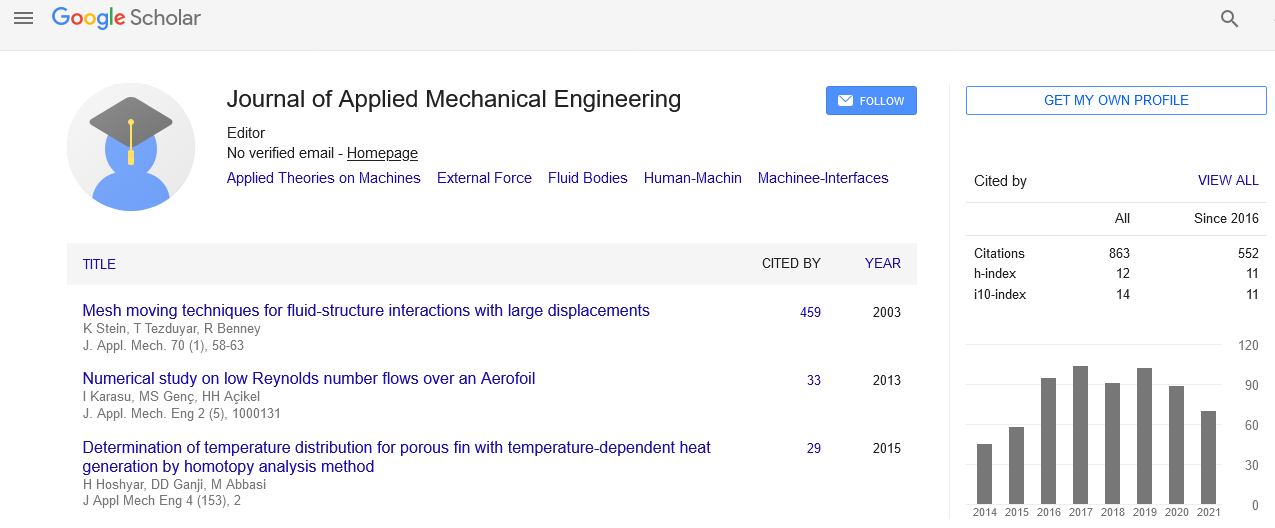Indexed In
- Genamics JournalSeek
- JournalTOCs
- CiteFactor
- RefSeek
- Hamdard University
- EBSCO A-Z
- OCLC- WorldCat
- Publons
- Google Scholar
Useful Links
Share This Page
Journal Flyer

Open Access Journals
- Agri and Aquaculture
- Biochemistry
- Bioinformatics & Systems Biology
- Business & Management
- Chemistry
- Clinical Sciences
- Engineering
- Food & Nutrition
- General Science
- Genetics & Molecular Biology
- Immunology & Microbiology
- Medical Sciences
- Neuroscience & Psychology
- Nursing & Health Care
- Pharmaceutical Sciences
A semi-sequential actuator design for multipoint tools
Joint Event on 2nd International Conference on Design and Production Engineering & International Conference on Mechatronics, Automation and Smart Materials
November 13-14, 2017 Paris, France
Matthias Wimmer
Munich University of Applied Sciences, Germany
Scientific Tracks Abstracts: J Appl Mech Eng
Abstract:
Multipoint tooling is a reconfigurable mold making technology that replaces solid moulds with an array of individually adjustable pins to create a discrete representation of the desired mould geometry. These pins have to be adjusted to very precise heights in reasonable time with manageable tool complexity to create a competitive new technology. Leadscrew driven pin actuation has proven to be precise, reliable and cost efficient. The height adjustment of the individual pins thereby can be either direct, with dedicated drives for each pin, or sequential, with one actuator used for all pins. A semi-sequential adjustment design is introduced to combine the advantages of both these designs. The passive, sensor less, pins in this concept are adjusted with an array of actuator devices. A setup algorithm ensures precise adjustment of each pin. The connection between the pins and the actuators is realized with a specifically designed form lock claw clutch. To ensure reliable function of this clutch the coupling process and parameters influencing coupling performance are analysed. Different methods of measurement are tested and evaluated to ensure the coupling�??s performance. Subsequently sensitivity analysis is used to evaluate the influence of each parameter on the coupling performance and create a reduced parameter set. A Metamodell of Optimal Prognosis (MOP) is derived and used to optimize the actuator parameters. Finally, the robustness of the optimized system is tested. After parameter optimization, the design operates reliable and can reduce the total costs of a multipoint tool significantly. Recent Publications 1. Im Y T, Walczyk D F, Schwarz R C and Papazian J M (2000) A comparison of pin actuation schemes for large-scale discrete dies. Journal of Manufacturing Processes 2: 247�??257. 2. Simon D, Kern L, Wagner J and Reinhart G (2014) A reconfigurable tooling system for producing plastic shields. Procedia CIRP 17: 853�??858. 3. Li M Z, Han Q G, Cai Z Y, Liu C G and Su S Z (2014) Multipoint Forming, in Hashmi S. (Ed) Comprehensive Materials Processing. 3: 107�??147, Elsevier, Oxford. 4. Luši�? M, Wimmer M, Maurer C and Hornfeck R (2015) Engineering Framework for Enabling Mass Customisation of Curvilinear Panels with Large Surfaces by Using Pin-type Tooling: CIRPe 2015 - Understanding the life cycle implications of manufacturing, Procedia CIRP 37: 265�??270. 5. Wimmer M, Luši�? M and Maurer C (2016) Vacuum assisted multipoint moulding �?? a reconfigurable tooling technology for producing spatially curved single-item CFRP panels, Procedia CIRP 57: 368�??373.
Biography :
Matthias Wimmer is a Postgraduate Research Student at Plymouth University and a Research Assistant at Munich University of Applied Sciences. His research is focused on reconfigurable tooling technologies in general and multipoint tooling in particular. In his PhD, encompasses the optimization of critical components within the multipoint tooling systems. He has published articles in reputed journals and presented at international conferences

